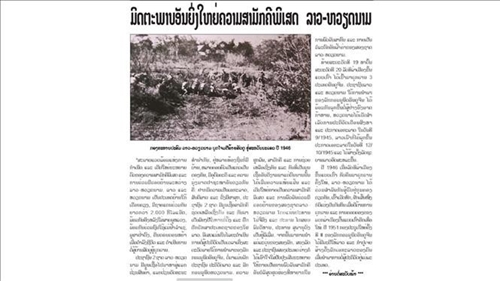The first editorial traced the tradition of solidarity and mutual support back to the shared revolutionary struggles under the leadership of the Indochinese Communist Party and, later, the Lao People’s Revolutionary Party and the Communist Party of Vietnam. It highlighted the close-knit bonds forged by Presidents Ho Chi Minh, Kaysone Phomvihane, and Souphanouvong, calling it a rare and invaluable asset in international relations, nurtured by generations of leaders and people.
    |
 |
|
The first article on Pathet Lao |
The piece detailed key historical milestones, starting with joint resistance war against colonialists in the late 19th century. Vietnam declared independence on September 2, 1945, followed by Laos on October 12, 1945, with establishment of the Lao Issara Government. In 1946 when colonial forces returned, the two nations fought side by side. In 1951, the Indochinese Communist Party’s second congress allowed Laos and Cambodia to establish their own parties for national revolutions. In 1954, Lao and Vietnamese forces played a critical role in the Dien Bien Phu campaign, securing victory against the French colonialists and paving the way for the Geneva Accords.
It noted continued unity against neocolonialism in 1955 when Laos and Vietnam countered their common enemy and achieved victory. A defining moment came in 1960, when Presidents Ho Chi Minh and Kaysone Phomvihane met and affirmed that the Laos - Vietnam bond was “more special and enduring than mountains and rivers.”
The two countries officially established diplomatic ties in 1962, and during the 1967–1973 period, they formed a united front to fight against the “special war” and “intensified special war” waged by foreign imperialist powers and their puppet forces, firmly defending the achievements of their revolutions, it said.
The second editorial described the Laos - Vietnam relationship as a rare and exemplary model of solidarity, forged through shared triumphs, from seizing power in 1945, defeating the colonialists in 1954, achieving national liberation in 1975, to advancing economic reforms through Vietnam’s Doi Moi and similar efforts in Laos.
Quoting President Kaysone Phomvihane, it called the relationship a “shining example of proletarian internationalism - special, enduring, and comprehensive.”
The revolutionary spirit and teachings of President Ho Chi Minh continue to guide successive generations of leaders, fostering a deepening partnership that remains robust, comprehensive and long-lasting in the new era, it concluded.
Source: VNA